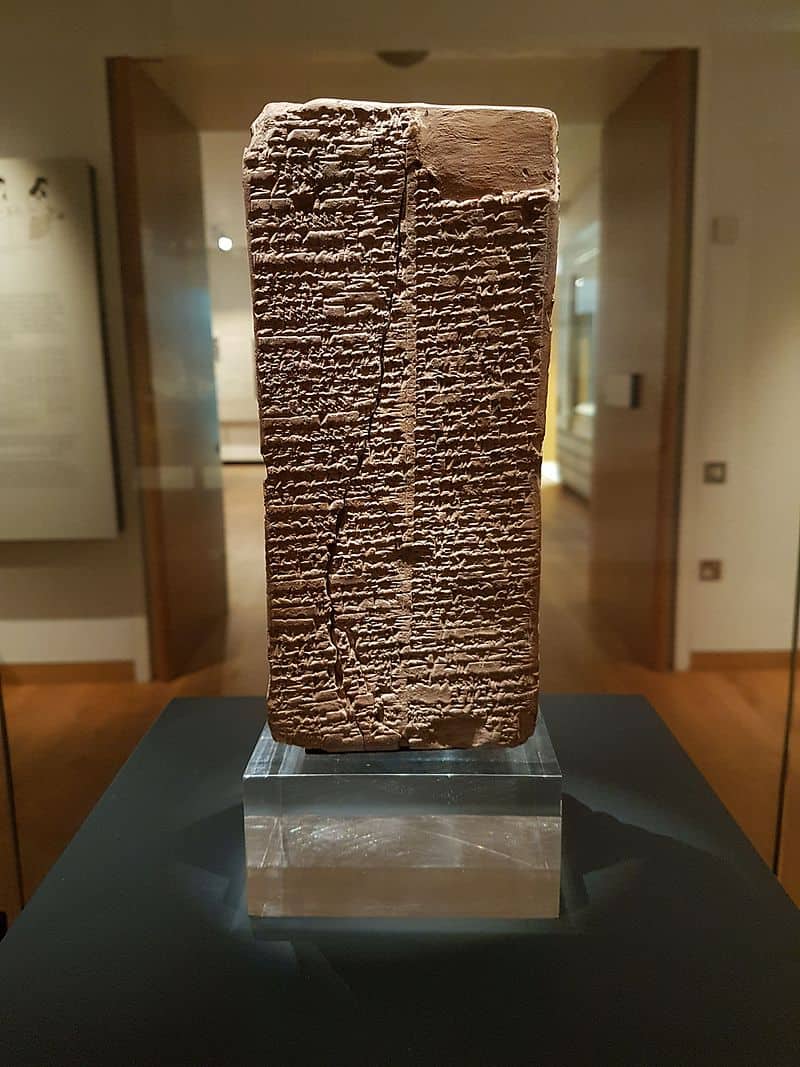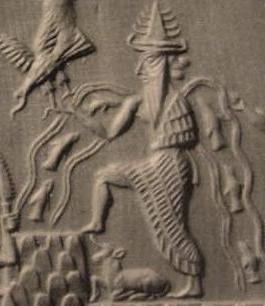While many people are unaware of this, the Great Flood has its origins in Ancient Sumer. According to the ancient Sumerians, ‘Eridu’ – modern-day Abu Shahrein, Iraq – was believed to have been the first city ever created, and was the home city of the great God Enki. The city is believed to have been founded circa 5400 BC.
Eridu is considered to be the city of the gods in ancient Mesopotamia, much like Teotihuacan located in Mesoamerica, which is known as the city of the Gods. The Sumerian King List states that Eridu was the “city of the first kings,” noting: “After the kingship descended from heaven, the kingship was in Eridu.”
According to Zecharia Sitchin’s Ancient Astronaut Hypothesis, the Anunnaki Gods observed that around 13 000 BC, the next time the Anunnaki Home Planet Nibiru passed near the Earth in the course of its Solar Orbit, a tidal wave would be triggered on Earth.

The Anunnaki on Nibiru correctly calculated that the passing of Nibiru close to Earth would result in a flood on the Earth as the ice sheets covering its poles would melt and raise the Oceans’ Water level. This melting Polar Ice Cap would result in a major Tidal Wave which would lead to the Great Flood recorded in the Bible.
Read also:
- Zecharia Sitchin’s Translation Of 14 Tablets Of Enki: Complete History Of Anunnaki
- Powerful Weapons Of Gods & Ancient Nuclear Blasts Happened In Mahabharata 12,000 Years Ago
- Did A Nuclear War Between Anunnaki Gods Destroy Sodom And Gomorrah?
- Mysterious Reincarnation Of Omm Seti: British Woman Who Proved To Have Lived In Ancient Egypt
The Anunnaki Gods decided to let humans drown in the coming Great Flood because they had become too numerous and also because the Chief Anunnaki God Enlil was unhappy about the fact that the Anunnaki Alien Gods were mating with humans and producing children called the Nephilims due to a female shortage amongst the Anunnaki.
According to Sitchin, these events are referred to in the Bible, Genesis chapter 6 verse 4: “The Sons of God came in unto the daughters of men.”
The Nephilims were considered an abomination by the Council of Anunnaki Gods, and it was decided that they should drown with the other humans in the coming great flood.
But Enki, the Anunnaki Ancient Astronaut Alien God who had created mankind did not agree with the decision of the Anunnaki to drown mankind in the Great Flood recorded in the Bible, and so Enki conspired to save Mankind.
Ziusudrah, who is Noah of the Bible was half-Anunnaki, being born out of the marriage between the Anunnaki God Enki and a human female. Enki provided him with a Blueprint for the construction of an Ark on a Tablet.
The Ark would serve both as a vessel for Noah and storage for Noah’s domesticated animals as well as the DNA of the animals collected around the Earth by Enki and Ninhursag as part of their ongoing Genetics project.
The Anunnaki Ancient Astronaut Gods went into orbit above the Earth when the flood approached, and in line with the observations made by the Anunnaki Alien Gods, the Polar Ice Caps melted into the Oceans causing a tidal wave, coupled with severe torrential storms lasting 40 days and 40 nights.

The Ark managed to keep Ziusudra / Noah and his precious cargo safe during the Flood with the Ark resting on the peaks of Mount Ararat when the flood finally subsided.
Ziusudra, or Noah, left the Ark after the flood and built an altar, offering a lamb sacrifice in gratitude to the Anunnaki God Enki for saving him from the Great Flood recorded in the Bible.
In the meantime, the other Anunnaki Alien Gods decided to return to observe the damage caused by the great flood, and when Enlil noticed the smoke from Noah’s altar, he realized that Enki had broken his oath to the Gods to remain silent about the flood.
Although initially angry, Enlil eventually accepted Enki’s decision after Enki explained that Noah was his son. Enlil also realized that mankind needed to revitalize the destroyed Sumerian Civilization after the Great Flood.
The great flood marked the end of the period known as the ‘Olden Times’, and in order to build Civilization on the Post-Flood Earth more efficiently, the Anunnaki Ancient Astronaut Gods divided into regions/Kingdoms:
Mesopotamia in the valley drained by the Tigris and Euphrates rivers;
The Sinai Peninsula;
Nile valley Kingdom which would become Egypt.
In some time, a 4th Region in the Indus Valley would be added to the Anunnaki Realms. The Ancient Astronaut Hypothesis stated that the Anunnaki then built a new Spaceport at the Giza Pyramid Complex with the Mission Control Center Platform built on Mount Moriah which would become the future site of Jerusalem.
Sitchin wrote: “They landed on Earth, colonized it, mining the Earth for gold and other minerals, establishing a spaceport in what today is the Iraq-Iran area, and lived in a kind of idealistic society as a small colony.
They returned when Earth was more populated and genetically interfered in our indigenous DNA to create a slave-race to work their mines, farms, and other enterprises in Sumeria, which was the so-called Cradle of Civilization in out-dated pre-1980s school history texts. They created Man, Homo Sapiens, through genetic manipulation with themselves and ape man Homo Erectus.”
Following the Great Deluge, life on Earth resumed and the Anunnaki carried on with their Civilization project in the newly divided regions, extracting more gold for their Home Planet Nibiru’s atmosphere which had been weakened by its recent Orbit close to Earth.
This Anunnaki Flood hypothesis was supported by Danish historian Thorkild Jacobsen. In his book “The Treasures of Darkness: A History of Mesopotamian Religion,” he explained the Eridu Genesis, the Sumerian creation myth that was found on a single fragmentary tablet excavated in Nippur by the Expedition of the University of Pennsylvania in 1893.
Other flood stories found among different cultures around the globe display similarities to the Sumerian story, i.e. The story of the Dravidian king Manu in the Matsya Purana, the Utnapishtim episode in the Epic of Gilgamesh, and the Genesis flood narrative found in the Bible. Interestingly, the ancient Greeks have two similar myths from a later date: The Deucalion and Zeus’ flooding of the world in Book I of Ovid’s Metamorphoses.









Foarte interesant!